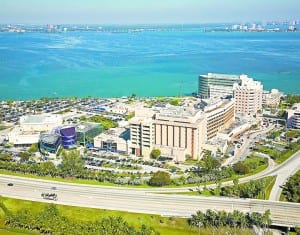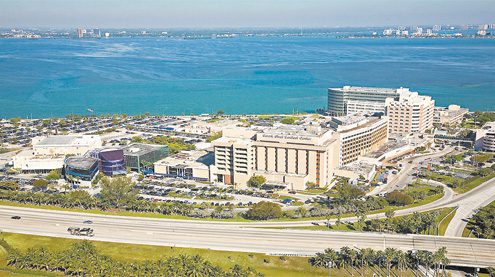
Using information developed by the U.S. Department of Commerce Bureau of Economic Analysis, Mount Sinai Medical Center was responsible for driving an estimated $1.3 billion into the local economy. Mount Sinai’s capital and operational investments increase local expenditures by both individual households and related industries.
With more than 3,000 employees, Mount Sinai provides salaries and wages in excess of $200 million and is Miami Beach’s largest employer and the 11th largest private employer in Miami-Dade County. This year alone, the hospital will expend more than $20 million in capital investments to strengthen its facilities and advance technology. Mount Sinai also is moving forward in its transition from paper-based medical records to an Electronic Health Record (EHR) system. This $60 million multiyear project will use the power of information technology to enhance patient care and safety.
“Hospitals play a significant role in the health of the local economy,” said Steven D. Sonenreich, Mount Sinai’s president and chief executive officer. “By focusing on our health care mission and managing our resources, we are able to remain financially stable and make a significant contribution to our community.”
In 2009, Mount Sinai provided more than $80 million in charitable and uncompensated care for the uninsured and underinsured. Mount Sinai is reaching out to the community every day to improve public health by providing 4,000 free health screenings, responding to urgent health care needs, such as the H1N1 influenza outbreak, and promoting health education.
As a comprehensive academic and research institution, Mount Sinai trains more than 160 residents and fellows in 18 different medical specialties. In cardiology, Mount Sinai’s partnership with New York’s Columbia University provides expanded faculty and learning opportunities. Mount Sinai’s undergraduate medical education program supports more than 325 students from a number of medical schools, including the University of Miami, Florida International University and Nova Southeastern University. Mount Sinai is working to advance medical science and receives funding from the National Institutes of Health to support research in cardiology, oncology, pulmonary, and Alzheimer’s Disease.
As Miami Beach’s only hospital, Mount Sinai’s emergency room is a critical part of the community’s health care infrastructure. Working closely with Fire Rescue, Mount Sinai’s emergency room is backed by the most active cardiac program in South Florida. Part of Miami-Dade’s STEMI (STsegment Elevation Myocardial Infarction) hospital network, Mount Sinai treats heart attack patients within minutes upon arrival. The hospital received accreditation as a certified Emergency Chest Pain Center, one of only two such hospitals in Miami-Dade to achieve this milestone.
Mount Sinai has achieved accreditation as a Comprehensive Stroke Center, one of only 16 hospitals in the entire state with this level of care. Using advanced imaging and groundbreaking catheterization techniques, neurointerventional radiologists are able to access tiny, distal veins in the brain and restore blood flow.
Mount Sinai has also forged unique collaborative programs with Miami Beach Community Health Centers and Borinquen Health Care Center to assist underserved mothers who cannot afford prenatal and maternal services. Mount Sinai’s Level III Neonatal Intensive Care provides the most advanced care available for high risk deliveries.
Mount Sinai’s positive impact is realized in both better physical and economic health for the Miami Beach community and beyond.
To learn more, please visit www.msmc.com to read an online version of Mount Sinai’s 2009 Community Benefit Report.






